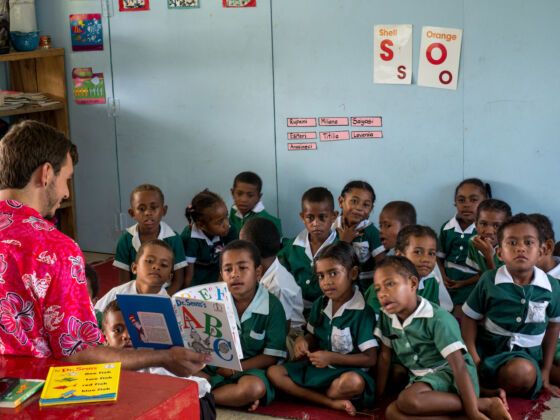Whether it’s the trekking guide who shares a closet-sized apartment with his sister, the homestay host who can’t scrape together the cash to repair her leaky roof, or the bright-eyed children who study in a thatched-roof schoolhouse, people in developing regions bring you face-to-face with the massive gaps in standards of living.

Confronting this economic divide can generate powerful emotions ranging from shock to shame to outright anger at the state of the world.
Point these emotions in a constructive direction, though, and you may find yourself planning your next big trip around finding a way to help.
The only question is how to make it happen.
Local voluntourism organizations can arrange every detail of your volunteer experience from placement to lodging. This can be ideal if you’re on a tight schedule.
Fees vary from reasonable to downright extravagant, and may leave you wondering why you’re paying for the privilege of volunteering. Often, organizations won’t put much thought into how best to leverage your professional skills, which can be frustrating if you’ve been in the workforce for a while and feel you have a lot to offer.
International long-term volunteer organizations like VSO, Peace Corps, and UNVolunteers do a better job of matching volunteer skills with specific needs.
Living expenses will be covered, and you may even receive a small stipend. However, you won’t have much control over what country you end up in, and the application process is lengthy. You may have to plan a year in advance or more.
If neither of these options works for you, there is an alternative: find a local NGO and plan your own volunteer experience from scratch. This is no small feat, and can be frustrating, rewarding, or both. Here are a few tips to get you started:
- Assess your skills: What can you do? Are you a writer? Foreign NGOs often need help writing grants. Are you an IT person?Most NGOs need computer help and can’t afford it. Are you an athlete? Run a sports program for kids. Your creativity is your only limit. Presenting organizations with a list of your skills makes it easier for them to imagine how they can put you to work, especially if they haven’t collaborated with western volunteers before.
- Assess your goals: As much as possible, visualize what you hope your experience will be. Are you looking in a specific country, or will the best opportunity to use your skills choose your location for you?Do you want to work full-time, or do you want part-time work with more time to explore on your own? Do you hope to work directly with local people, or do you see yourself working in an office? Do you needan organization that will cover room and board, or are you okay with paying for your accomodations?
- Research: Now you’re ready to start your search. Matador and Idealist are good places to start, but there are many small local organizations that those sites miss.Google will prove invaluable here. Come up with search terms based on your skills and goals. An IT person hoping to volunteer in Nepal might try “Nepal computer vocational training,” “Nepal rural computing,” and “Nepal computer lab” for starters.Begin a list of contact information for organizations you find. Keep in mind that the organizations needing the most help don’t have the resources to even be on the web.
- Look in your own backyard: Seek out community organizations of immigrants from your target country. Though hard to find, these groups are often the most useful to know. They’ll be excited to meet someone who wants to help people in their homeland, and they may provide you with local contacts you wouldn’t have found otherwise.
Other organizations at home may be interested in what you’re trying to do. Some Rotary clubs provide a small amount of travel funding if you’re willing to give a presentation at a chapter meeting or write an article for their newsletter when you return.
- Get in touch: Write up a friendly e-mail articulating your skills and goals, and send it to the organizations you’ve identified. Don’t patronize, but use easy to understand language.You can recycle the same letter, but tailor it a bit each time. Don’t be afraid to cast a wide net; it never hurts to have too many options. Also, always ask if organizations can suggest other people you should contact.
- Prepare for uncertainty: People in developing countries often take a different approach to e-mail. Don’t despair if your well-crafted letter elicits one line responses inviting you to discuss options over tea when you arrive.These organizations do need your help, but they may not have the written language skills to explain why. A second e-mail or even an international phone call via Skype may prove more enlightening, but be ready to not have all the answers.
If you’ve done your homework, you’ll likely find yourself sitting on a plane to a developing country with a list of organizations you’re excited to meet, but with no mental picture of what your life will be like once you get there.
Breathe deeply, and remind yourself that opportunities exist that you can’t even be aware of from a distance. Be patient, and you’ll almost certainly find a way to fit in once you hit the ground. You’ve set yourself up for one hell of an adventure; now just hang on for the ride.
This is the first installment in a three-part series. Stay tuned for more!
Community Connection:
Matador member MST is currently running a contest that combines volunteering with tourism. Check out her website for contest details.